Travel sanctions didn’t stop rich Russians from going on holiday last year, a new report has revealed.
When Russia invaded Ukraine in February 2022, the European Union suspended visas for Russian travellers.
But wealthy tourists simply decided to holiday elsewhere.
According to research from flight data firm ForwardKeys, wealthy Russians returned to travel “with a vengeance”.
From the start of the war on 24 February 2022 until the end of December, premium class tickets for Russian outbound travel boomed, increasing by 10 per cent on pre-pandemic levels.
Normal Russians stayed home, however, with economy class travel during the same period down 70 per cent on 2019 levels.
Where are wealthy Russians going?
Seat capacity - the number of seats an airline sells -on flights from Russia to the European Union is down 99 per cent compared to pre-pandemic, ForwardKeys explains.
This limit on seats comes as most European countries are restricting the number of visas they offer to Russian travellers.
But plenty of other countries still welcome tourists from the country.
Thailand appears to be one of the most popular destinations for these holidaymakers, with premium-class travel up 81 per cent from 2019.
Premium travel to the UAE is up 108 per cent. Tourists have also flocked to Turkey (up 41 per cent), the Maldives (up 137 per cent) and Egypt (up 181 per cent).
There is no shortage of tickets available for these destinations Seat capacity on flights between Russia and the Middle East increased by 27 per cent compared to the equivalent period before the pandemic.
Seat capacity on flights between Turkey and Russia increased by 26 per cent.
Turkish and Middle Eastern airlines have benefited the most from the surge, said Olivier Ponti, VP of Insights, ForwardKeys.
“The greatest impact on air travel to and from Russia since the invasion of Ukraine last February has been war-related sanctions, which have particularly benefitted Turkey and the Middle East, as they have maintained direct flights to and from Russia,” he said.
Travellers have flocked to Antalya, the Turkish riviera resort. Flights there from Moscow’s three major airports, Vnukovo, Domodedovo, and Sheremetyevo, were up by 144 per cent, 77 per cent, and 74 per cent respectively, compared to pre-pandemic levels.
But this travel boom is strictly limited to the rich, said Ponti.
“The most eye-opening feature is the premium class boom, which appears to illustrate a division in Russian society between the rich, who holidayed in style, while the less affluent stayed at home,” he said.
However, the wealthy travel surge appears to have collapsed in 2023, FlightKeys claim.
International travel has largely collapsed, even for the wealthy. Premium class flight bookings are 26 per cent behind 2019 levels and economy 66 per cent down.
How has the war impacted flight prices and travel times?
The war closed the airspace above much of Ukraine and Russia. This means an increase in flight times.
37 per cent of air traffic between Europe and the Asia Pacific region now takes more than eight hours, up from 23 per cent before the invasion.
Average fares have also increased, as the cost of living surges. The price of flights between Europe and Asia Pacific was 20 per cent higher than before the pandemic in 2019.


